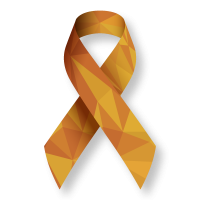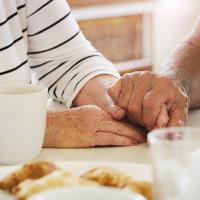- What to Expect with Bladder Cancer
- New Bladder Cancer Patient Questions
- Tips for Coping With Your Bladder Cancer Diagnosis
- Bladder Cancer Support Groups
- Bladder Cancer Patient Advice
- Cxbladder is a Non-Invasive Surveillance Alternative
If your doctor recently diagnosed you with bladder cancer, chances are, you're completely dazed since those were words you probably never thought you'd hear. First, you need to realize you're not alone. Several resources and people can help. You may be frightened, overwhelmed and even angry at the moment — all normal responses. As you start your journey with bladder cancer, it's essential for you to learn the facts.
Bladder cancer is among the most commonly diagnosed cancers. Each year in the U.S., there are almost 80,000 new cases. It's estimated that by the year 2025, there will be more than 750,000 survivors of bladder cancer in the U.S.
Take the time to learn everything you can about your bladder cancer diagnosis and your options for treatment. Your doctor is a great place to start, but here we'll provide you with information and bladder cancer patient advice to hopefully make this journey a little easier.
What to Expect When Living with Bladder Cancer
Having to live with bladder cancer can be a challenge for you and those you love. Knowing what to expect can make your journey more comfortable. Some issues surrounding your diagnosis and treatment that may affect you follow.
1. Bladder Cancer and Your Diet
While there's evidence showing a link between diet and other types of cancer, there's not enough solid evidence yet that links the risk of developing bladder cancer to specific foods or diets. Some researchers believe that drinking enough water and eating more vegetables and fruits can reduce your bladder cancer risk slightly, but the best way of improving your overall health is to maintain a balanced, healthy and nutritious diet.
2. Challenging Side Effects and Symptoms
With bladder cancer, you may experience various side effects and symptoms. Many could be due to cancer treatments. These symptoms include:
- Blood in your urine
- Sexual effects
- Poor appetite
- Fatigue and sleep interference
- Chemotherapy side effects

Numerous options available to you can help you reduce or manage these symptoms and side effects to improve your quality of life during and after your treatment.
3. Treatment Planning
Each type of bladder cancer treatment will have a different goal, such as:
- Stopping or slowing the cancer growth
- Preventing or delaying cancer recurrence (the cancer coming back)
- Destroying bladder cancer cells
- Destroying cancer cells that could have metastasized (spread) outside of your bladder
- Managing incurable cancer symptoms
4. Quality of Life Issues
If you have muscle-invasive bladder cancer, radical cystectomy with urinary reconstruction is your standard of care. Although the doctor's main focus is to treat cancer, it's important for you to address quality of life issues following your surgery.
Two of the most common issues are sexual and urinary.
Sexual Issues
-
Men: A side effect for men with radical cystectomy is erectile dysfunction since the nerves involved with an erection reside at the prostate base, which the surgeon removes during radical cystectomy.
-
Women: The ability to achieve orgasm could be impacted if the nerve bundles lining the vagina become damaged. Women's sexual arousal could also be affected if some of the blood supply in the clitoris diminishes during surgery.
These are concerns you should discuss with the surgeon, as certain techniques could help lessen or prevent such issues.
Urinary Issues
Depending on which type of urinary diversion you and your doctor decide on following radical cystectomy, you may experience:
- Putting a catheter into your stoma (an artificial opening created in a hollow organ) or emptying your urostomy pouch (a small collection bag that sits outside your body)
- The stress of having to care for the skin surrounding your stoma
- Medical issues arising from urinary reconstruction, urine blockages or leaks
- Changed sexual functioning due to your urostomy pouch
Fortunately, you can address these problems, but it might take some resilience and patience on your part. Start by learning how your urinary tract works. Then, talk to your doctor about an enterostomal therapy nurse. They can teach you how to properly care for your stoma and the skin around it.
5. Survivorship Care Plan
Once you complete your treatments, you may receive a survivorship care plan from your doctor. This resource will help you navigate life as a survivor of bladder cancer, including monitoring for recurrence, follow-up care, potential side effects from treatment and guidelines to maintain good overall health. The American Cancer Society offers resources to help you create your survivorship care plan.
6. Follow-up Care
After treatment, your doctor and healthcare team will work with you to come up with an ongoing care plan. Surveillance and routine follow-up care are important to:
- Manage remaining side effects
- Monitor your overall health
- Check for potential signs of recurrence
New Bladder Cancer Patient Questions To Ask
Finding out that you have cancer is certainly not easy, and you'll likely have questions. You might not even know what questions to ask or where to begin, but just gaining a better understanding of your bladder cancer diagnosis and your plan of treatment can help you feel more in control and worry less about what lies ahead.

“Too many people leave the doctor’s office not understanding what the doctor said,” says Kevin, who is living with bladder cancer. The best thing you can do is to write down all the questions you have and sit down with your doctor to go over them.
As a newly diagnosed bladder cancer patient, some questions to ask your physician include those below.
1. What Stage Is My Bladder Cancer?
Knowing your bladder cancer stage is essential since most of the time, bladder cancer treatment is based on the clinical stage of the tumor when you first receive a diagnosis. Stage is how deep the doctor believes cancer has grown into the wall of your bladder and whether or not it has spread past your bladder.
2. What Side Effects Can I Expect to Encounter?
Knowing what side effects you can expect will allow you to consult with your doctor about potential treatments that can ease or eliminate them, which will make your bladder cancer journey more comfortable.
3. How Will This Diagnosis Affect My Sexuality and/or Fertility?
It's always good to know what to expect. If bladder cancer affects your sexuality, you're at least prepared for it and can have a discussion beforehand with your partner and possibly talk with your doctor about certain remedies. If you want to get pregnant, knowing whether or not bladder cancer will affect your fertility is critical. Again, there may be options that can help you.
4. Do I Need to Start Treatment Right Away?
By knowing when you'll be starting treatment, you can better prepare for potential side effects of the treatment, mobility issues (you may need to set up a support system to help with daily activities), depression and more. You might need to take time off work or find care for your children if you have any.
5. What Is the Goal of Each Treatment?
What should you expect from treatment? Is the treatment to cure your cancer, make you feel better or both?
Tips for Coping With Your Bladder Cancer Diagnosis and Treatment
Incorporating the following methods to help manage your bladder cancer diagnosis and treatment can make your journey easier.
1. Understanding Your Diagnosis and Treatment Plan
Knowing your diagnosis and treatment plan can help eliminate the anxiety of what's to come. After having your questions answered, ask your doctor if they can provide you with some resources to learn more about your diagnosis and the treatment plan they're going to put you on.
2. Preparing and Keeping Your Doctor's Appointments
Never skip a medical test or doctor's appointment, even if your check-ups come up clear. Whether you're scheduled for check-ups or tests every three or six months or once a year, it's vital for you to keep those appointments. There could be a high risk of recurrence, and it's essential for doctors to catch any recurrence while it can still be treated.
3. Finding and Using Resources
The emotional and physical toll of bladder cancer treatment, including chemotherapy, surgery and follow-ups, can be intensive, time-consuming and draining. Everyone needs some type of support and help. Consider joining a bladder cancer patient support group or even an online community.
Other types of support include talking with a professional counselor who's experienced in treating individuals with cancer. Talking with someone you don't know is often easier than trying to open up to a family member or friend. You can also find and use resources through Cancercare.org.
4. Coping With Physical Side Effects of Treatment
Having to live with the treatment's side effects is often one of the hardest aspects of dealing with cancer. For instance, you could experience certain side effects during chemotherapy at different points. Or, you could experience side effects after your chemo, and some could be long-lasting. Consult with your doctor about coming up with a complete plan for addressing the problems you experience. Try to make sure the plan suits your lifestyle and needs. Consider the following:
-
Physical activity: Exercise can help with the side effects of treatment — such as fatigue, swelling and depression — so that you can recover quicker. Yoga, tai chi or a light walk is perfect for getting your endorphins and blood flowing.
-
Medication: Your doctor might prescribe you medication to help ease treatment-related gastrointestinal side effects, such as nausea, vomiting, diarrhea and constipation.
-
Contemporary therapies: There are also contemporary therapies that could help treat pain, stress, nausea, sexual side effects and other problems you might experience during your treatment, such as mind-body techniques, acupuncture and massage therapy.
5. Coping With Emotional Side Effects
When you first receive a cancer diagnosis, you might feel like your life just went out of control because:
- You're not sure if you're going to survive.
- Doctors use medical terms you're not familiar with, and it gets confusing.
- Treatments and doctor visits disrupt your normal routine.
- You feel lonely and helpless.
- You can't do things you enjoy anymore.
Despite feeling out of control, try to remember that there are helpful steps you can take. First, it can help to learn all you can about your cancer. Ask your doctor all the questions you need to in order to understand the diagnosis and treatment of bladder cancer.
Some individuals find that staying busy helps. If you have the energy, why not take part in certain activities like crafts, music or learning something new?
Many cancer patients feel sad. They believe they've lost their good health and that the life they used to have before their disease is now over. Feeling sad is a normal response, even after completing treatment. It can take time to accept and work through all the changes you're going to have to make.
Sadness can drain your energy, and you may feel fatigued or not want to eat. These feelings lessen or go away over time for some people. For others, however, they can become stronger and get in the way of everyday life. When this occurs, it could be depression. Cancer treatment can add to the issue by changing how the brain works. Fortunately, doctors can treat depression.
6. Coping With Financial Issues
Bladder cancer can significantly impact a patient’s financial status over time. You may incur a whole range of expenses along with your treatment costs, but resources are available to help you come up with a financial plan and, if eligible, obtain financial assistance.
Along with information from health care providers and social workers, several local and national service organizations help cancer patients facing financial challenges.
7. Connecting With Others
Individuals who receive a bladder cancer diagnosis often experience a range of different emotions and feelings. It's important for you to receive emotional support to help you cope with these feelings and emotions.
Join a support group to share your experience and learn from other individuals on how you can cope with the changes. Discussion forums are great online places as well where you can share with other patients and ask questions. Meet a counselor if you prefer a more personal and private setting.
Bladder Cancer Support Groups
Fortunately, many resources and strategies are available to help you and your loved ones cope better and stay as emotionally and physically healthy as possible. Numerous organizations and support groups exist where you can search for resources and access information either in-person or online, including the following.

1. American Cancer Society
The American Cancer Society is a community-based, nationwide voluntary health organization devoted to tackling and eliminating cancer. Although most individuals know the American Cancer Society for their research, they do so much more. They help people prevent cancer by promoting a healthy lifestyle. They research cancer and what causes it to find better treatments and more answers. They battle for lifesaving policy changes. They provide everything from the latest cancer information to emotional support for those touched by cancer.
2. Bladder Cancer Advocacy Network
Founded in 2005, BCAN is the only national advocacy organization dedicated to supporting individuals affected by bladder cancer and advancing research on the disease. They advocate for increased funding for research and greater public awareness to identify effective treatments and hopefully find a cure for the disease.
3. MyLifeLine
MyLifeLine is a service promoted by the Cancer Support Community to make it easy to connect with family and friends, get control back and receive emotional, social and practical support throughout the cancer journey.
4. Cancer Survivors Network
This network is a community of people who are living with or touched by cancer. They share discussions, personal stories and expressions of care to hopefully allow you to find inspiration and strength.
Bladder Cancer Patient Advice
When you become a new bladder cancer patient and have just received your diagnosis, it can feel like you're on an emotional rollercoaster. You'll likely go through four stages:
- Denial and shock
- Depression and anger
- Readjustment and hope
- Rebuilding
Here are some tips to help you through this process.
1. Maintain a Healthy Identity
When struggling with cancer, individuals frequently turn their identity to that of "being sick," becoming a patient rather than a survivor. Just because you have an illness doesn't mean you can't keep your personality and retain the spirit you had before you received your diagnosis. Remember, you're much more than your cancer.
2. Save Your Energy for More Important Things
Start saying "no" to things that aren't essential to your health and family at the moment. Save your energy for managing your bladder cancer and healing, as well as for those who are important in your life.
3. Lean on Your Support System
“Get a support network in place — people to help you and listen to you,” says Marcia, the wife of a bladder cancer patient.
Use your support system, whether that's your friends, family, church, community or support groups. “If you face bladder cancer, don’t try to go it alone23,” says celebrity couple Marilu Henner and Michael Brown.
Don't be afraid to ask for help from your support system. The stronger your support is, the more likely you'll open up with your concerns and feelings, and the better off you'll be emotionally and mentally.
4. Practice Self-Care
Take care of yourself emotionally, physically and spiritually. Read a good book, spend time in nature or love your pets. Exercise, eat a healthy diet and reduce unhealthy chemicals from your life. Watch comedy movies or immerse yourself into a hobby, particularly one that takes your mind off of your diagnosis.
5. Be Open About Your Diagnosis and Treatment
“Too many people feel shame or embarrassment about it,” said Kevin, a bladder cancer patient. “It’s important to be open about the issues and not try to hide them.”
You don't have to suffer alone with your newly diagnosed bladder cancer. It's understandable how you're feeling. You have a long journey ahead of you, so be sure you're using all the resources and support you can to help get you through this.

Cxbladder is a Non-Invasive Surveillance Alternative
Patients that have been treated for bladder cancer have unique monitoring needs to protect against the threat of recurrence. After assessing a patient’s risk profile, doctors will recommend a regular ongoing schedule of cystoscopies to examine the inside of the bladder and urethra.
Cxbladder Monitor is a non-invasive alternative that can safely reduce the burden of cystoscopy in those being monitored for recurrent non-muscle invasive bladder cancer. In suitable cases, Monitor can safely reduce the frequency of invasive cystoscopy required. When no recurrence has been detected after several years, Cxbladder Monitor testing can provide a reliable alternative to cystoscopy after consulting with your physician.
Learn more about Cxbladder Contact us for more information
Sources:
- https://cdn.reachmd.com/uploads/related_-_client_provided_materials/bcan_basics_2nded.pdf
- https://bladdercancercanada.org/en/newly-diagnosed/
- https://www.verywellhealth.com/living-well-with-bladder-cancer-4136308
- https://bladdercancer.net/coping/
- https://www.cancer.org/cancer/bladder-cancer/after-treatment/follow-up.html
- http://www.cxbladder.com/au/patient-resources/patient-support
- https://fightbladdercancer.co.uk/get-help/surviving-bladder-cancer
- https://stanfordhealthcare.org/medical-conditions/cancer/bladder-cancer/patient-care-resources/what-to-expect.html#whattoexpect
- https://www.cancer.org/treatment/survivorship-during-and-after-treatment/survivorship-care-plans.html
- https://www.curetoday.com/community/barbara-tako/2016/08/cancer-survivor-identity-crisis-i-am-more-than-my-cancers
- https://www.cancer.org/cancer/bladder-cancer/after-treatment/follow-up.html
- https://www.cancercare.org/publications/319-after_a_bladder_cancer_diagnosis_questions_to_ask_your_doctor
- https://www.cancertherapyadvisor.com/home/tools/fact-sheets/after-a-bladder-cancer-diagnosis-questions-to-ask-your-doctor/
- https://www.cancerresearchuk.org/about-cancer/bladder-cancer/living-with/coping
- https://bladdercancercanada.org/en/dealing-with-emotions/
- https://www.curetoday.com/publications/cure/2014/cancer-guide2014/at-diagnosis-dealing-with-emotions
- https://www.medicalnewstoday.com/articles/322625.php
- https://www.cancercare.org/publications/325-coping_with_bladder_cancer
- https://www.cancer.net/cancer-types/bladder-cancer/coping-with-treatment
- https://www.betterhealth.vic.gov.au/health/conditionsandtreatments/bladder-cancer#lp-h-9
- https://www.cxbladder.com/us/blood-in-your-urine/
- https://www.wcrf.org/sites/default/files/Bladder-Cancer-2015-Report.pdf
- https://bcan.org/assets/Bladder-Cancer-Discussion-Guide.pdf
- https://www.cancercare.org/diagnosis/bladder_cancer
- https://www.cancer.gov/about-cancer/coping/feelings
- https://www.cancer.net/navigating-cancer-care/financial-considerations/financial-resources
- https://bcan.org/online-support-community/






